 Gaenswein's episcopal coat of arms
Gaenswein's episcopal coat of arms
is a tribute to Benedict XVI
by Andrea Gagliarducci
Translated from

January 5, 2013
Will Georg Gaenswein's future be under the sign of Benedict XVI, as his present already is? One might say Yes, judging from the design that the new Prefect of the Pontifical Household has chosen for his coat of arms when he is ordained an archbishop by the Pope on the Feast of the Epiphany.
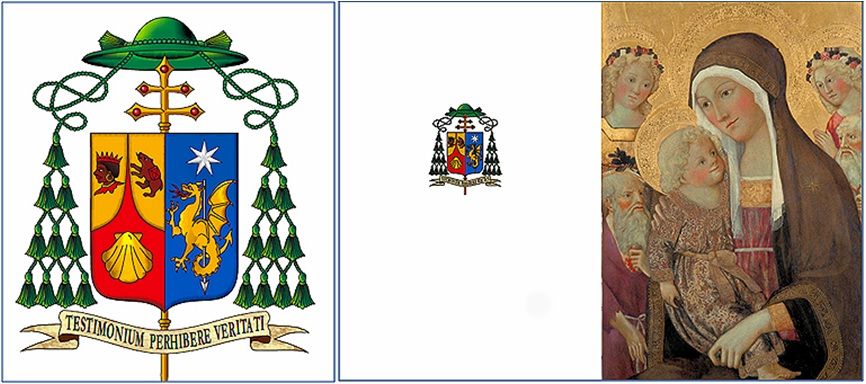 Besides the coat of arms, the Korazym article also has the photo of what looks like the front of the new archbishop's commemorative ordination card. Unfortunately, the Madonna image used is not identified.
Besides the coat of arms, the Korazym article also has the photo of what looks like the front of the new archbishop's commemorative ordination card. Unfortunately, the Madonna image used is not identified.
The seal is divided in two parts: on the right are the main elements of Benedict XVI's own coat of arms - with the crowned Moor, St. Corbinian's bear and St. Augustine's scallop; and on the right, a dragon rampant on a blue field surmounted by the Star of Bethlehem. In heraldry, the dragon signifies loyalty, vigilance and military valor. In Church heraldry, it evokes the dragon fought by St. George, the new archbishop's name saint [and also of the Pope's brother]. In this case, the dragon appears to be spitting fire against the 'dwelling' of the Pope, but it is transfixed by the lance of fire that seems to have come from the Star of Bethlehem.
The episcopal motto he has chosen is also reminiscent of Cardinal Ratzinger's episcopal motto, 'Cooperatores veritatis' (co-workers in the truth). Gaenswein's is “Testimonium perhibere veritati” (to render testimony to the truth).
Clearly, the Pope's private secretary since 2003 wants to imprint his episcopal ministry with the signs of Benedict himself. And the message his coat of arms and the motto conveys is that of a faithful, loyal and vigilant co-worker, one who places himself in defense of a Pope who seems to attract no end of hostility from those who do not like him and wish to discredit the Church.
He does so by availing of a heraldic privilege given to the Prefect of the Pontifical Household, namely, to incorporate the reigning Pope's coat of arms into his own coat of arms. His immediate predecessor, now Cardinal James Harvey, did not do that, nor did now Cardinal Stanislaw Dsiwisz when John Paul II made him a bishop and Prefect-Adjunct of the Pontifical Household, although Harvey's predecessor as Prefect, Dino Monduzzi did.
But Gaenswein marches to his own beat (or better, to Benedict's beat), and his coat of arms stands in stark contrast to the unkind things said and written about him during the months of the Vatileaks furor. Yet Don Giorgio, as he is widely known in Rome, has come out of that fire stronger than before, since the Pope has promoted him to be Prefect of the Pontifical Household and elevated him to the rank of archbishop, but he still remains his private secretary.
He is now the only 'filter' that controls direct access to the Pope. All this, in the face of attacks against him primarily in German circles.
And yet, Gaenswein's choices for the two prelates he requested to be present for the kiss of peace after his ordination tomorrow are two Germans. The first is Mons. Robert Zollitsch, Archbishop of Freiburg and president of the German bishops' conference.
It is well known that among German prelates considered most 'faithful to Rome', Zollitsch has always been thought to be 'at the mercy of progressive currfents. But among the Germans at the Vatican, he is considered a 'faithful bishop', whose problem appears to be that his German colleagues think he is not 'big enough' for the position he occupies
[yet they elected him!].
The fact that Gaenswein has singled him out for his ordination would seem to show that, despite the hostility of the German hierarchy and clergy to him, the Pope's secretary wishes to be on good relations with them.
[I think Gagliarducci overlooks what seems to me the obvious and natural reason for Gaenswein's choice of Zollitsch - namely, that Zollitsch is the Archbishop of Gaenswein's home diocese. If only for that, he would have asked him, even if Zollitsch were not president of the German bishops' conference.]
In the past seven years, the German media, apparently at the urging of elements in the German Church, have taken every occasion to float the rumor that Benedict XVI was about to 'promote and remove' Gaenswein from the Vatican by naming him bishop of some important German diocese, including Munich and Regensburg, at some point.
The other German bishop specifically asked by Gaenswein to be present for his ordination is Archbishop Gerhard Mueller, Prefect of the Congregation for the Doctrine of the Faith - obviously, a close associate of Benedict XVI, who turned over his former cardinal's apartment to Mueller for his use. Mueller, of course, as president of the Regensburg-based Institut Papst Benedikt XVI, is the nominal publisher of the
Collected Writings of Joseph Ratzinger.
Gaenswein's third choice is perhaps surprising: New York-born Archbishop Charles Brown, now Apostolic Nuncio to Ireland, named to that post in 2011 by Benedict XVI, who plucked him from a quiet middle-management position in the Congregation for the Doctrine of the Faith for the challenging job, an appointment warmly endorsed by Gaenswein.
[The two worked together for years at the CDF.]
What will be the future of Gaenswein? His episcopal nomination opens new horizons for him. His role in the Rome-based Fondazione Joseph Ratzinger-Benedetto XVI will become fundamental. For a bishop who is a defender of the Pope, what better way to actively defend the thinking of Jospeh Ratzinger and to do so to insure that his studies and teachings may be perpetuated and interpreted in the right way?
One could hypothesize that he will eventually be the president of this Foundation, and be committed, alongside Mueller, to the publication of Joseph Ratzinger's Collected Writings. A work which, for the Italian edition, Mueller has been working closely with the Vatican publishing house LEV.
As for the episcopal motto chosen by Gaenswein, "To render testimony to the truth" obviously echoes Cardinal Ratzinger's own "Co-workers in the truth" and means his closeness and faithfulness to the Pope as a worker in the truth.
The expression was used by Pius XII in his first encyclical
Summus Pontificatus, when he wrote: "There is nothing that makes us feel how much we owe our offi ce and even our own time than in rendering testimony to the truth".
[P.S. The original expression comes from Jesus's answer to Pilate in John 18:37: "For this I was born and for this I came into the world, to testify to the truth". The USCCB translation obviously uses a simpler formulation of the words.]
Its use as an episcopal motto is not original. It had previously been used by John Charles McQuaid, Bishop of Dublin, who died in 1973, but who was accused of sexual abuses (charges which were later completely refuted).It is also the motto of Mons, Piotr Jarecki, auxiliary bishop of Warsaw who was recently arrested for drunk driving.
To the superstitious, it would seem that both precedents are not a good omen for the Pope's secretary. But one can be sure that with his meticulousness, his precision, and above all his faithfulness and love for the Pope, Georg Gaenswein will rise above any bad omens.
[What a strange way to end an otherwise positive piece!]
Some write-ups in the past about Mons. Josef Clemens, who was Cardinal Ratzinger's private secretary for 19 years, suggested that the cardinal considered him like the son he never had. It would not be far-fetched to say he also found another son in Georg Gaenswein, whom he has honored far beyond any papal private secretary has been honored by his Pope in modern times, and whose filial affection and devotion to the Pope no one but his inveterate detractors could possibly doubt. Prayers and all best wishes for Mons. Georg - the other Mons. Georg in Benedict XVI's life, after his own brother.
Instead of translating any of the various mini-biographies of GG that have sprouted all over the Italian media, I will follow Beatrice'es example and post this article by Alessandra Borghese in 2009, which I posted then in the PEOPLE AROUND THE POPE thread. ]
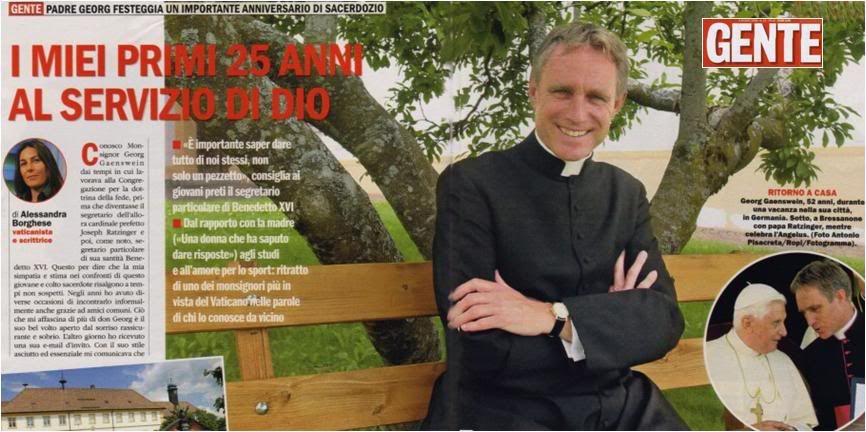 On the occasion of Georg Gaenswein's recent silver jubilee as a priest, Alessandra Borghese wrote a profile of him for GENTE, a PEOPLE-style Italian weekly. Here is a translation of the article as published on Alessandra's website. The illustrations are thanks to Beatrice who scanned them from the magazine and posted them on her site
25 years of priesthood:
On the occasion of Georg Gaenswein's recent silver jubilee as a priest, Alessandra Borghese wrote a profile of him for GENTE, a PEOPLE-style Italian weekly. Here is a translation of the article as published on Alessandra's website. The illustrations are thanks to Beatrice who scanned them from the magazine and posted them on her site
25 years of priesthood:
A portrait of Mons. Gaenswein
by Alessandra Borghese
Translated from
GENTE
Issue of June 3, 2009
I have known Mons. Georg Gaenswein from when he was working at the Congregation for the Doctrine for the Faith - before he became the private secretary to then Cardinal Joseph Ratzinger.
This to say that my sympathy and esteem for this young and cultured priest goes back some time. Over the years, I have had many occasions to meet him informally, if only because we have friends in common.
What fascinates me most about don Georg is his beautifully open face with its reassuring smile.
The other day, I received an e-mail invitation. In his usual quiet, spare and essential style, he informed me that on June 1 at 7 p.m., he would be celebrating Holy Mass in the Church of St. Stephen of the Abyssinians in the Vatican, and that afterwards, friends and relatives would gather together for dinner at the Casina Pio IV in the Vatican Gardens.
A simple statement explained the reason for the invitation, and it struck me because, brief as it was, it seemed laden with emotion: "Twenty five years ago, I was ordained a priest!"
For don Georg, this anniversary is a moment for thanksgiving and reflection. His decision to become a priest had developed consistently - it was not a lightning bolt out of a clear blue sky.
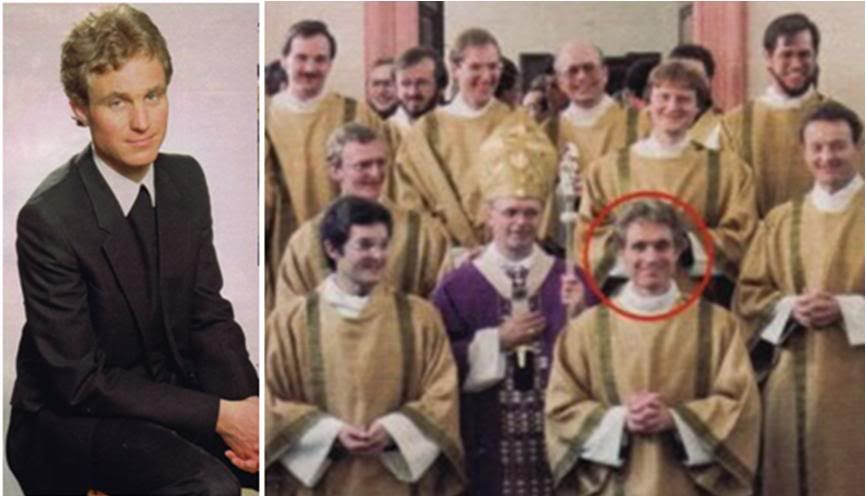 Left photo, Georg at 18; right photo, with his fellow ordinands when he was ordained a deacon at age 24.
By the time he was 18, those who knew him already saw in his clear and transparent ways the roots of his confrontation with the priestly vocation.
Left photo, Georg at 18; right photo, with his fellow ordinands when he was ordained a deacon at age 24.
By the time he was 18, those who knew him already saw in his clear and transparent ways the roots of his confrontation with the priestly vocation.
"They were roots which just kept growing with the years and bearing good fruit," as he himself likes to say.
Initially, his family was not convinced about his choice, but they changed their mind after he showed that he did have a true and sincere vocation.
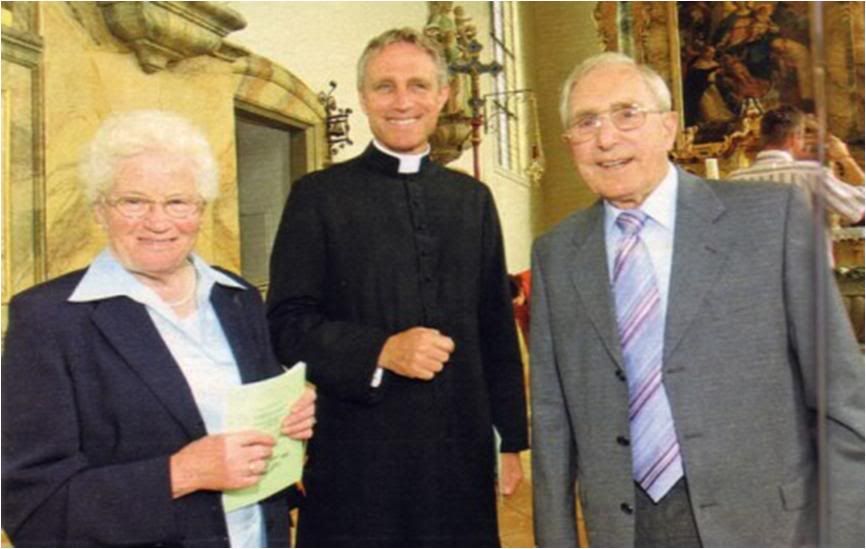 With his parents in a photo taken in 2007.
With his parents in a photo taken in 2007..
His relationship with his mother, which continues to be very strong, was decisive and fundamental in this. Don Georg describes her as "a lady who never asked or imposed anything, but who, above all, always knew how to answer her children's questions."
It would be easy to try and draw a balance sheet of don Georg's first 50 years of life - 25 of them as a priest - as he is one of the most high-profile monsignors in the Vatican.
Knowing him, I would say that he looks on this anniversary as a take-off point rather than a point of arrival. The young Gaenswein certainly never planned to end up in Rome and become the closest collaborator of the Pope. Indeed, he has never hidden his emotion and surprise to find that 'his' cardinal had been elected Pope.
On more than one occasion, I have heard him say that he never made any specific plans for himself but always simply followed orders from his superiors.
I remember once when he had to address a group of young men who were still intimidated by the thought of eventually choosing the priestly vocation.
Don Georg, in a direct way and without skirting around, simply told them: "As the Lord taught, we can only gain life if we lose it!"
He added: "The moment of deciding what to do with one's life is, of course, most important - so if you decide something, you must do it with all your heart, from the depth of your soul. For this, one must know how to give oneself totally, not just a piece. Only then, you can achieve fullness".
I thought listening to him that he certainly had doctrinal clarity!
In the past few years, his external behavior has changed by force majeure, as it were. At the start, his open and cordial attitude to everyone was perhaps too ingenuous for someone in his position, leaving himself open to superficial criticisms. And so, he has become much more prudent.
But he has never hidden from friends his surprisingly constant emotion at being with the Pope, no matter how difficult his job is. To be with the Pope is not just a 'glamorous' task - he sees it above all as service in humility and total devotion.
Everything he does is for another person, which means he must renounce himself and his own desires. And yet, despite the pile of work to the done and the many commitments and appointments on the Pope's agenda, he does share intimate moments with the Pope - the daily morning Mass, praying the rosary together in the afternoons,
small talk over meals or while they take a daily walk in the gardens or on the roof terrace of the Apostolic Palace.
In the popular imagination, don Georg is often compared to Father Ralph in the famous novel and TV series The Thorn Birds: beautiful but 'impossible'.
He knows that the physical aspect - which is a gift one receives gratuitously - may nonetheless be useful for pastoral work and announcing the Gospel. But certainly not as a source of pride nor arrogance. However, because of this, he has been the object of envy and victim of petty jealousies at the Vatican.
So, he tries to act in such a way that distinguishes who he is from the image that people wish to see in him. He bases his own discernment on the sincerity of his inter-personal relationships. He believes that "sincerity is proven with time and cannot be hidden".
Perhaps the aspect of him that is least-known to the public is his academic credentials. A doctor of Canon Law from the University of Munich [also the Alma Mater of Joseph Ratzinger],
he was a professor of Canon law at the Pontifical University of Santa Croce in Rome, during which time he published 17 studies on canonical and theological subjects.
But I also think his sports personality had much to do with his human formation. He says "sport offers the possibility of competing with others in a positive way - it is a healthy way to relate to others and to measure oneself against others".
Obviously, he misses his beloved Black Forest native land, and when he speaks of it, his eyes do not hide his nostalgia.
His principal traits are seriousness, obstinacy and perseverance. And if we have to name a failing, it would be his lack of patience - in the sense that he is so determined to do things and see them realized as perfectly as possible that he cannot wait to see the outcome of his efforts.
In conclusion, Mons. Gaenswein is a completely realized man and even if he says he has no secret wishes, he will continue being talked about, and certainly, to distinguish himself in his service to the Church.
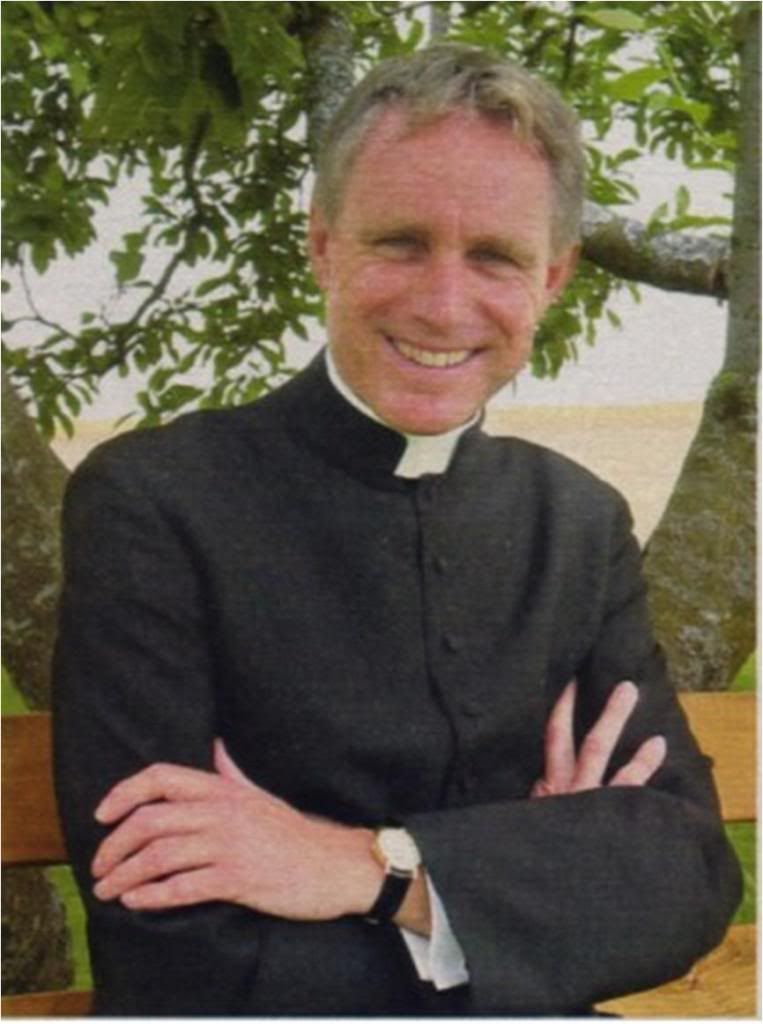
This being a significant milestone in Mons. Gaenswein's life. here are some more filephotos for an brief overview of his life:
 Left, the Gaenswein family home in Rieden; right, Georg with his parents and three of his siblings, photographed in 2009. [One brother was cropped out by the magazine's photo editor.]
Left, the Gaenswein family home in Rieden; right, Georg with his parents and three of his siblings, photographed in 2009. [One brother was cropped out by the magazine's photo editor.]
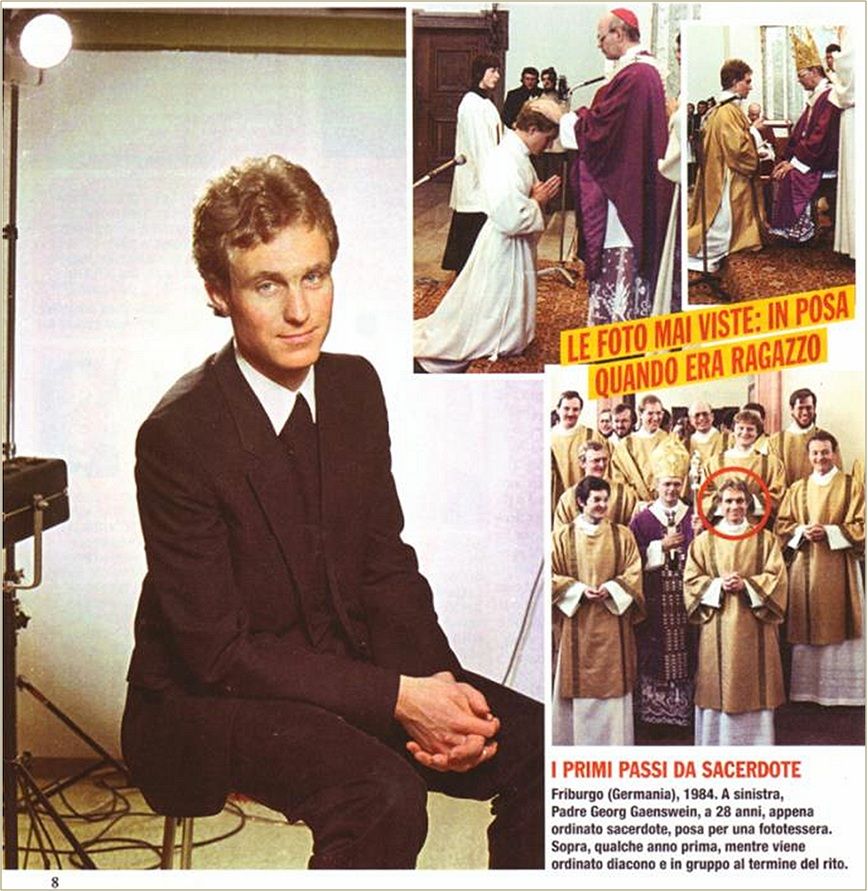 The Gente spread in 2009 features photos of Georg at 28 shortly after being ordained a priest (left); top right of his priestly and diaconal ordinations in Freiburg; and bottom right, with his fellow deacons.
The Gente spread in 2009 features photos of Georg at 28 shortly after being ordained a priest (left); top right of his priestly and diaconal ordinations in Freiburg; and bottom right, with his fellow deacons.
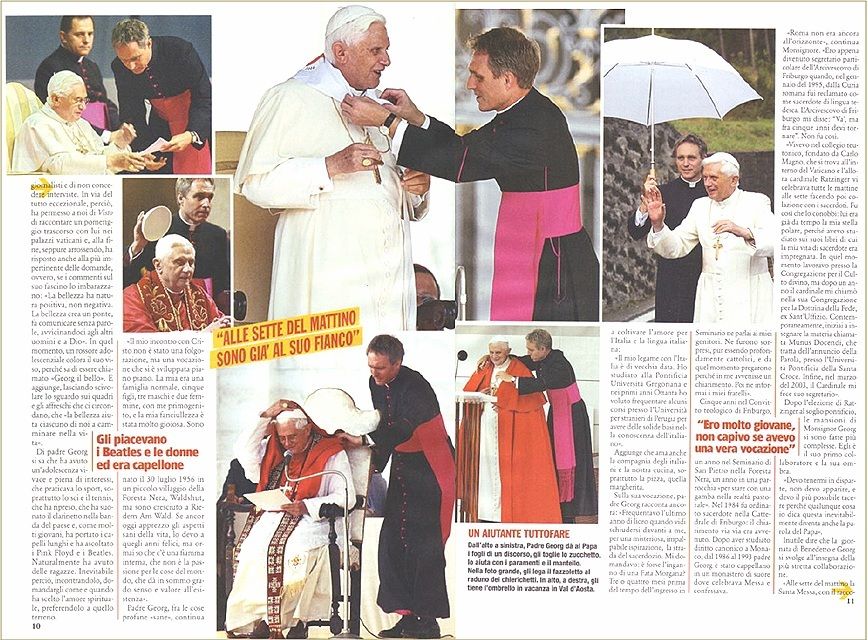 The Gente spread of 2009, featuring photos of Gaenswein with Benedict XVI.
The Gente spread of 2009, featuring photos of Gaenswein with Benedict XVI.
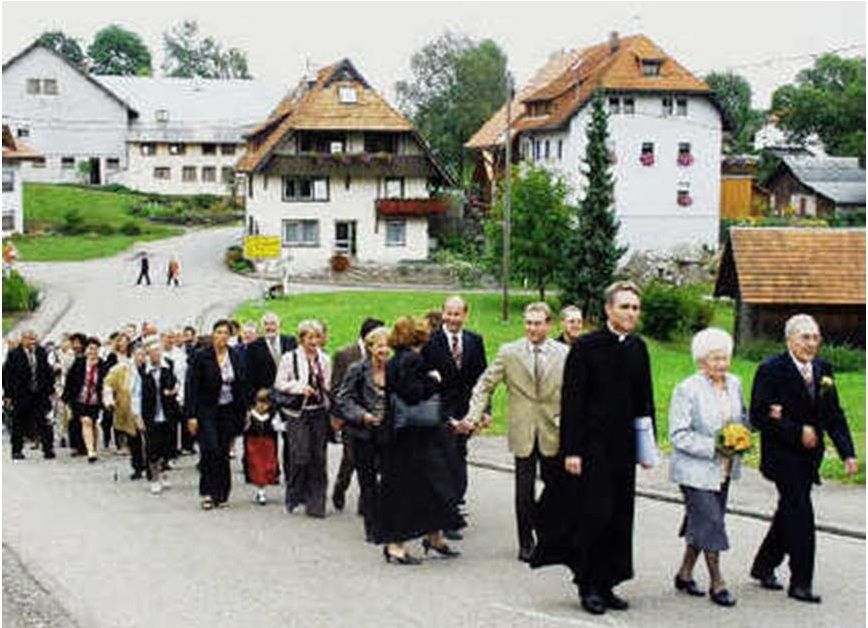 In 2007, Gaenswein with his parents lead their townmates to the Church for Mass.
In 2007, Gaenswein with his parents lead their townmates to the Church for Mass.
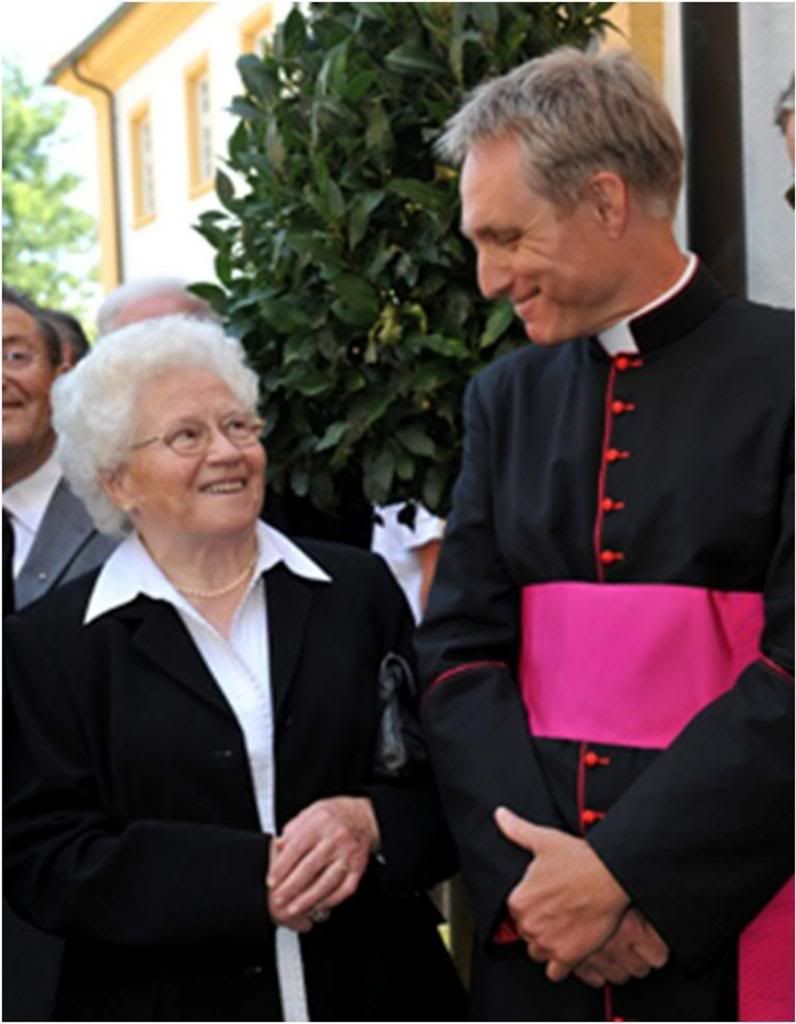 In August 2009, Gaenswein photographed with his Mom Gertrud when he celebrated his 25th jubilee as a priest in his hometown. Three months later, in October, she died suddenly of a heart attack. She was 78.
In August 2009, Gaenswein photographed with his Mom Gertrud when he celebrated his 25th jubilee as a priest in his hometown. Three months later, in October, she died suddenly of a heart attack. She was 78.
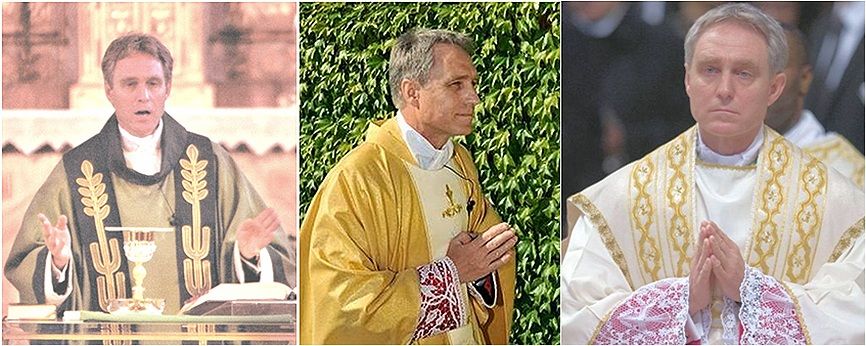 Gaenswein, from left, in 2006; in 2009 when he marked his silver jubilee as a priest; and this morning, at St. Peter's for his episcopal ordination.
Gaenswein, from left, in 2006; in 2009 when he marked his silver jubilee as a priest; and this morning, at St. Peter's for his episcopal ordination.
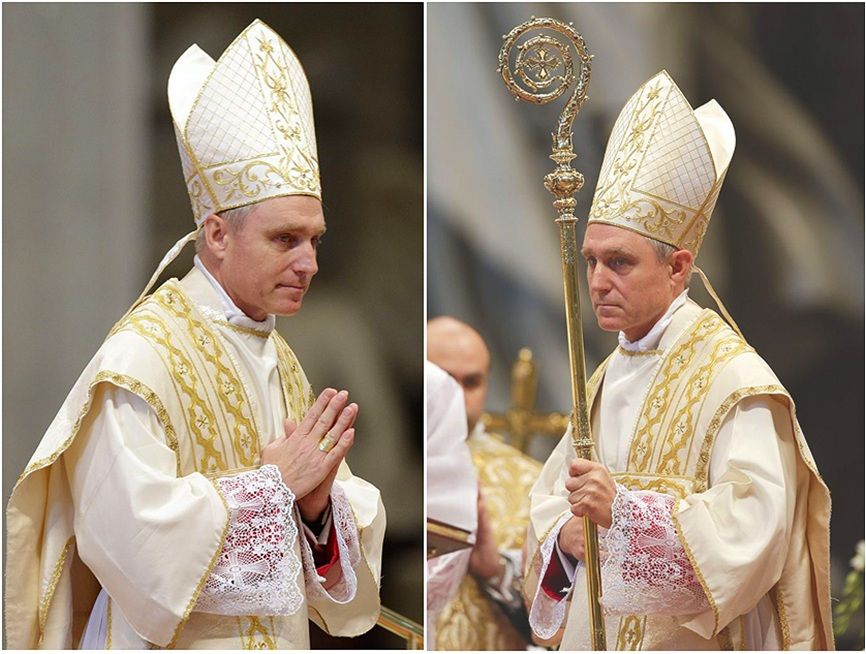 First photos of Gaenswein as an ordained bishop, with miter and pastoral staff.
First photos of Gaenswein as an ordained bishop, with miter and pastoral staff.
One of the hitherto unpublicized details of the new arhcbishop's life surfaced today in the Italian media - it appears that he spent his first two years as a seminarian at the FSSPX mother house in Econe, Switzerland. It is said that neither Gaenswein nor the Vatican has ever denied this. That, along with the fact that he taught at the Opus Dei;s Pontifical University of Santa Croce in Rome, appears to reinforce his reputation as a true 'conservative'.
P.S. Paul Badde wrote a lengthy profile and commentary on Gaenswein for Die Welt yesterday, which I have yet to translate.
[Modificato da TERESA BENEDETTA 07/01/2013 03:26]